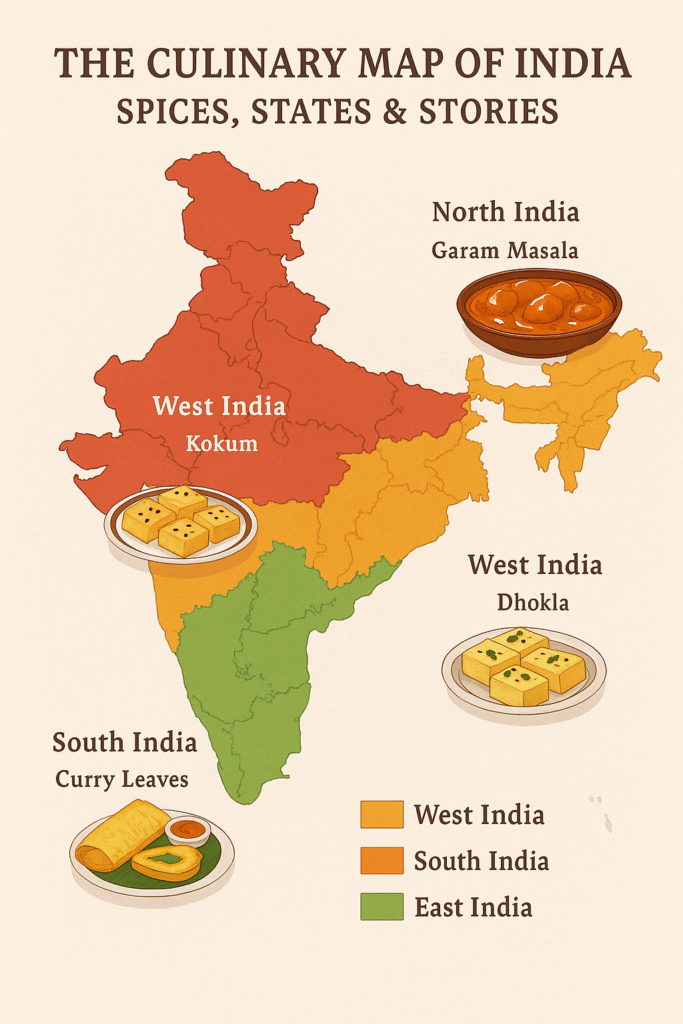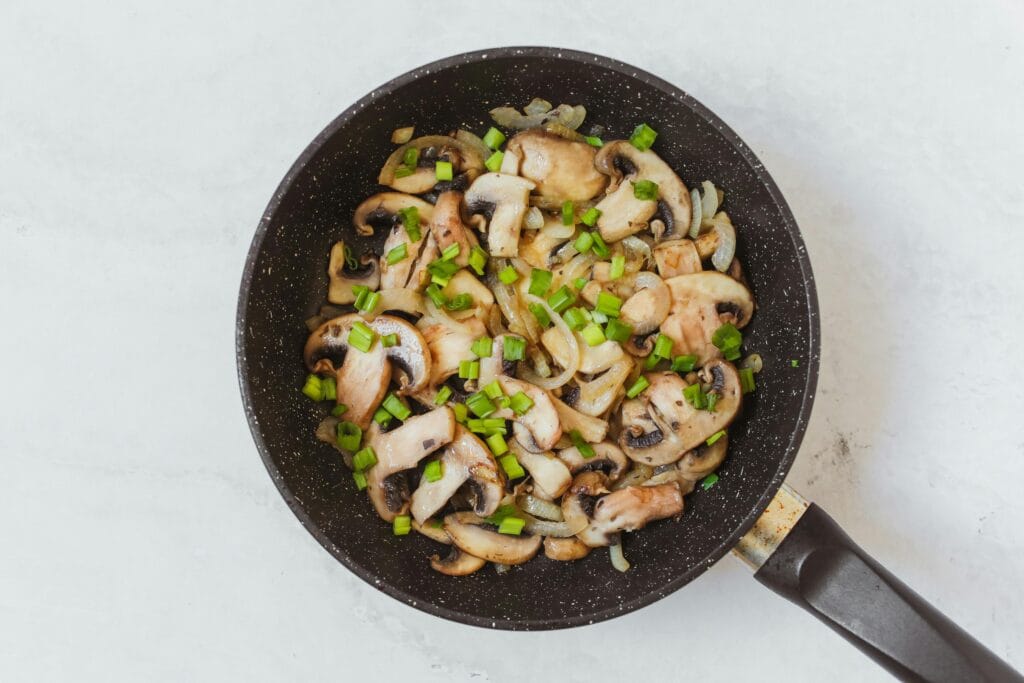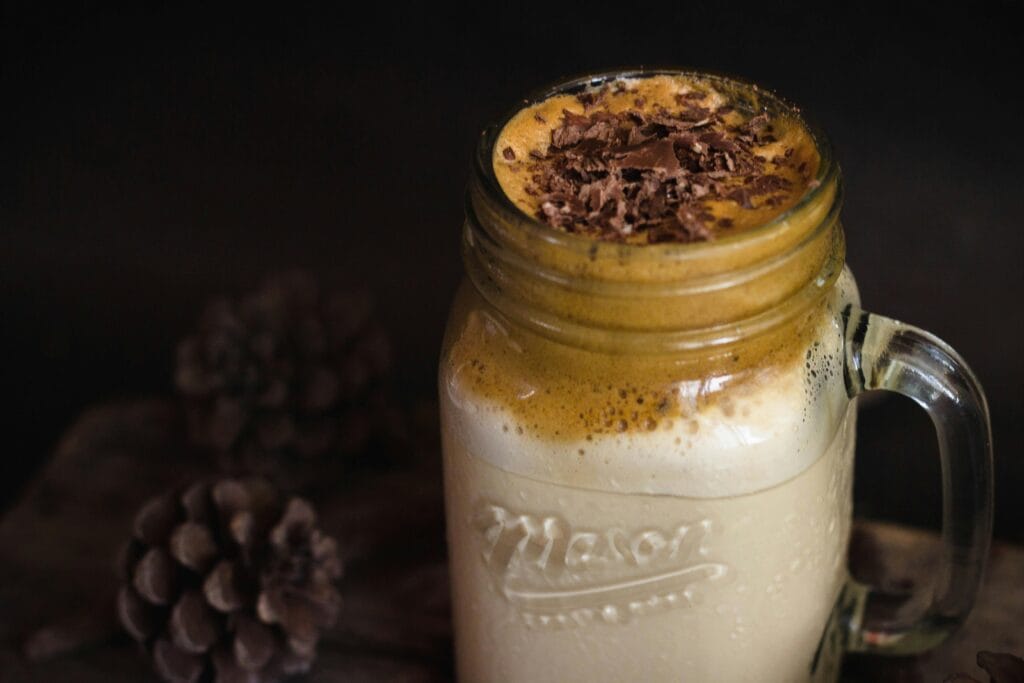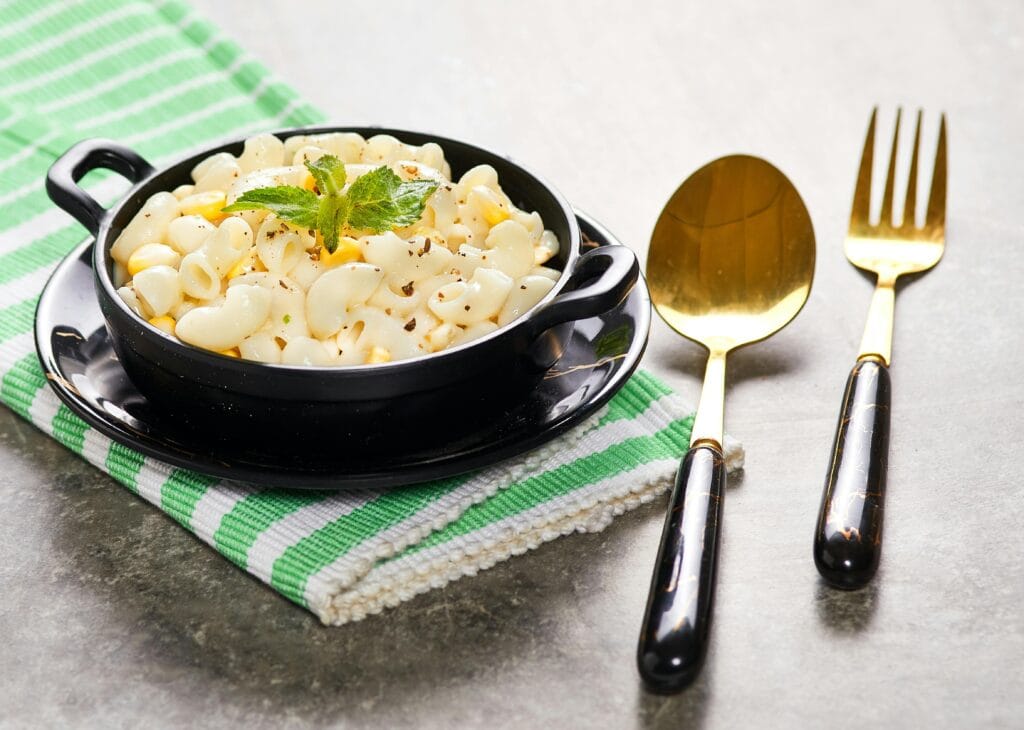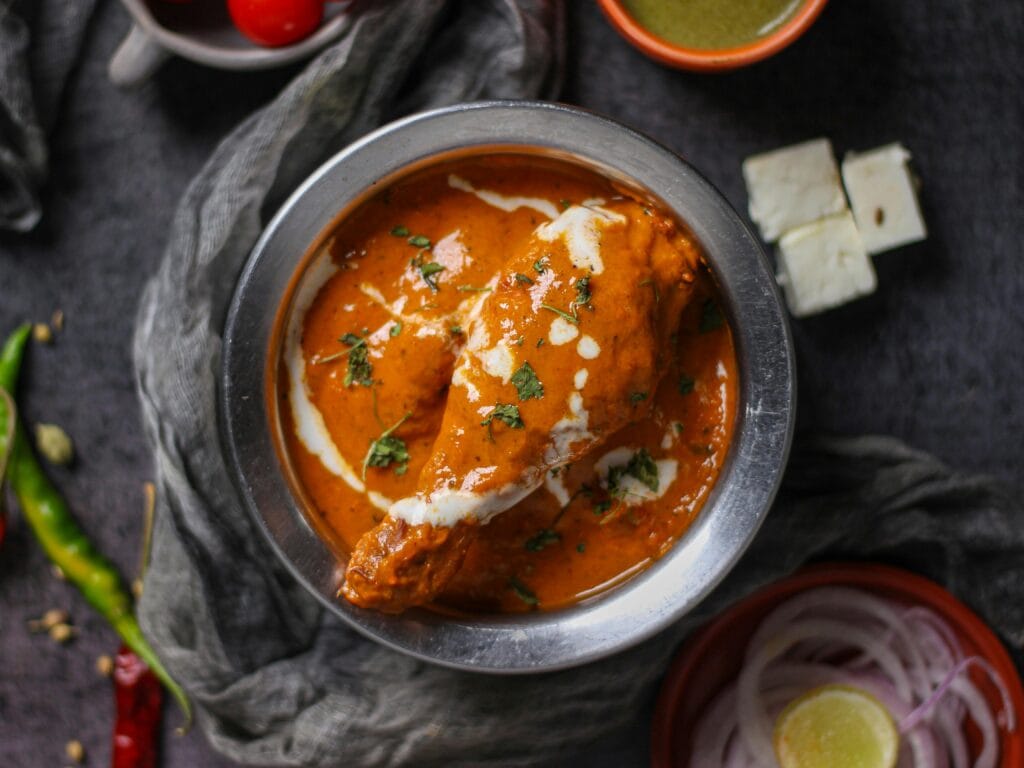🗺️ Introduction: India on a Plate
India is not a country you merely visit—it’s one you taste. The diversity of India’s cuisine is so profound that crossing from one state to another can feel like entering an entirely new country. Each region speaks a different food language, told through spices, techniques, staples, and deeply rooted stories.
This blog takes you on a flavorful journey through the culinary map of India, revealing how spices and signature dishes reflect the land, the people, and the soul of each state.
🌶️ North India: Hearty, Rich, and Bold
🕌 Punjab: The Land of Butter and Bounty
Signature Spice: Garam Masala
Must-Try Dish: Butter Chicken, Sarson da Saag with Makki Roti
Punjab’s cuisine is all about abundance and warmth—thick gravies, ghee-laced breads, and smoky tandoor flavors. The beloved butter chicken is now a global phenomenon, but its roots lie in Delhi’s Moti Mahal restaurant, created by Punjabi chefs post-Partition.
Story: Punjab’s fertile land and agrarian culture gave birth to generous thalis, where food represents love, hospitality, and joy.
⛰️ Kashmir: Fragrance Over Fire
Signature Spice: Saffron, Dry Ginger, Fennel
Must-Try Dish: Rogan Josh, Yakhni, Kahwa
Unlike the spice-forward North Indian stereotype, Kashmiri cuisine leans on aromatic, subtle flavors. Influenced by Persian traditions, the Wazwan (royal multi-course meal) is a blend of Central Asian and local culinary wisdom.
Story: Kashmir’s cuisine reflects its heritage as a seat of poets, kings, and traders—delicate, rich, and poetic.
🏞️ Uttar Pradesh & Delhi: Mughal Legacy and Street Food Royalty
Signature Spice: Clove, Cardamom
Must-Try Dish: Nihari, Kebabs, Chaat, Kachori
The Mughal kitchens of Delhi and Lucknow birthed slow-cooked masterpieces like nihari, korma, and galouti kebabs. Meanwhile, street foods like chaat showcase UP’s obsession with tangy, crunchy, spicy bites.
Story: Here, royal kitchens coexisted with bazaars—making cuisine both aristocratic and accessible.
🌾 West India: Spice, Sweet, and Everything Savory
🥭 Maharashtra: Konkan to Deccan
Signature Spice: Goda Masala, Kokum
Must-Try Dish: Misal Pav, Puran Poli, Kolhapuri Mutton
From the fiery flavors of Kolhapur to the coastal sweetness of Malvani dishes, Maharashtra’s cuisine is a balance of boldness and comfort.
Story: The cuisine is shaped by Maratha warriors, coastal trade, and agrarian simplicity.
🪔 Gujarat: Sweet Harmony and Vegetarian Art
Signature Spice: Ajwain, Mustard Seeds
Must-Try Dish: Undhiyu, Dhokla, Thepla
Gujarati food is known for sweet notes in savory dishes, thanks to a Jain-influenced vegetarian palette. Dhokla and khakhra aren’t just snacks—they’re legacy items passed from generations.
Story: The state’s semi-arid terrain encouraged food preservation techniques, and its Jain-Bania culture promoted vegetarianism with balance and beauty.
🏜️ Rajasthan: The Art of Survival Cooking
Signature Spice: Asafoetida (Hing), Red Chillies
Must-Try Dish: Dal Baati Churma, Gatte ki Sabzi, Ker Sangri
Rajasthan’s dry climate gave rise to a cuisine rich in pickles, legumes, and non-perishable, oil-based dishes. Every bite is engineered to resist desert heat and celebrate resilience.
Story: Rajasthani cuisine is the poetry of scarcity turned into royal feasts.
🥥 South India: Spice, Coconut, and Sacred Simplicity
🌴 Kerala: God’s Own Country of Spices
Signature Spice: Black Pepper, Curry Leaves, Mustard Seeds
Must-Try Dish: Avial, Malabar Biryani, Appam with Stew
As a historical spice hub, Kerala boasts layered flavors with coconut, tamarind, and curry leaves. Meals often come served on banana leaves—signifying sustainability and tradition.
Story: Kerala’s cuisine is shaped by Christian, Muslim, and Hindu influences—each adding a chapter of flavor and fusion.
🥥 Tamil Nadu: Ancient Grains and Fiery Depth
Signature Spice: Mustard Seeds, Dried Red Chillies
Must-Try Dish: Sambar, Rasam, Chettinad Chicken
Home to the Chettinad community, Tamil Nadu’s dishes range from light fermented foods to fiery meat curries. Dosa, idli, and filter coffee are just the start.
Story: Tamil cuisine is one of the oldest continuous culinary traditions, with ties to Sangam literature and temple rituals.
🏞️ Karnataka: From Udupi Temples to Coorg Hills
Signature Spice: Mangalorean Masala, Cardamom
Must-Try Dish: Bisi Bele Bath, Mysore Masala Dosa, Coorgi Pandi Curry
Karnataka’s food shifts dramatically across regions—from the coconut-rich coasts to the Kodava pork dishes in the misty hills of Coorg.
Story: Udupi cuisine was shaped in temple kitchens, where devotion met culinary finesse.
🌾 Andhra Pradesh & Telangana: Fire and Flavor
Signature Spice: Guntur Chilli, Tamarind
Must-Try Dish: Gongura Mutton, Pulihora, Hyderabadi Biryani
Known for its heat, Andhra’s cuisine is not for the faint-hearted. Telangana dishes are more millet-heavy, with smoky, earthy notes.
Story: Telangana’s tribal and Deccan influences created a robust cuisine full of depth, while Andhra’s coastal bounty added brightness and punch.
🐟 East India: Rivers, Rice, and Ritual
🌾 West Bengal: Fish, Rice, and Literary Flavors
Signature Spice: Mustard Seeds, Nigella Seeds
Must-Try Dish: Shorshe Ilish, Luchi with Alur Dom, Mishti Doi
Food in Bengal is poetic—like its people. From the morning shukto (bitter) to evening sweets, it flows like the Ganga itself.
Story: Bengali cuisine reflects its literary, artistic, and riverine culture, where each meal is a layered narrative.
🌾 Odisha: Simplicity and Sacred Offerings
Signature Spice: Panch Phoron
Must-Try Dish: Dalma, Pakhala Bhata, Chhena Poda
Odisha is the spiritual capital of temple cuisine. The Jagannath Temple’s Mahaprasad is considered divine, nourishing millions.
Story: The use of satvik (pure) cooking methods in clay pots shows food as a spiritual gift.
⛰️ Northeast India: Earthy, Fresh, and Unexplored
Signature Spice: Fermented Bamboo, Bhut Jolokia (Ghost Pepper)
Must-Try Dish: Smoked Pork with Bamboo Shoot (Nagaland), Eromba (Manipur), Jadoh (Meghalaya)
Northeast India’s cuisine is rooted in indigenous traditions, fermentation, and herbal ingredients.
Story: These dishes aren’t just food—they are ancestral knowledge, shaped by forests, hills, and oral history.
📌 Spice Trails: How Geography Shaped Taste
| Region | Spice Dominant | Reason |
|---|---|---|
| Kerala | Black Pepper, Cloves | Historic spice trade routes |
| Rajasthan | Dried chillies, Asafoetida | Scarcity of fresh herbs |
| Bengal | Mustard seeds, Pungent oils | River-fed farming |
| Kashmir | Saffron, Dry Ginger | Cold weather, Mughal influence |
| Tamil Nadu | Tamarind, Curry Leaves | Tropical climate, temple kitchens |
Each state’s spice logic is shaped by climate, trade, and belief systems. Spices are more than flavor—they’re identity.
🍽️ Conclusion: One Country, Many Kitchens
The culinary map of India is a storybook of civilizations. From tribal foraging to Mughal opulence, Buddhist fasting to temple thalis—every region tells its tale through what’s cooked, how it’s served, and when it’s eaten.
So the next time you taste a dosa, savor biryani, or sip kahwa—know you’re not just enjoying a dish. You’re consuming history, geography, and legacy.
India doesn’t have one cuisine. It has thousands of micro-kitchens, and each deserves to be celebrated, plate by plate, spice by spice.
